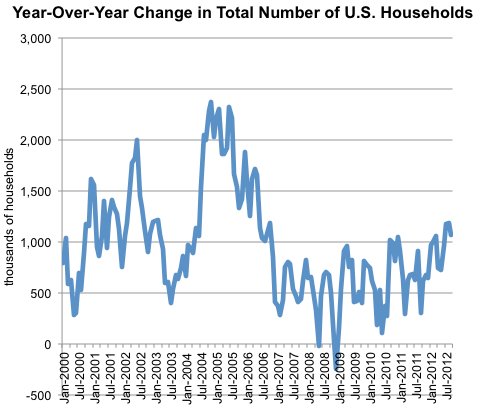
CATHERINE RAMPELL
Dollars to doughnuts.
Almost exactly a year ago I wrote an article about how tortoise-slow growth in household formation was hurting the economy. Unemployed new high school and college graduates were staying with their parents rather than moving into homes of their own, thereby depriving the economy of all the spending and hiring that goes along with setting up new digs. Under normal circumstances, each time a household is formed it adds about $145,000 to output that year as the spending ripples through the economy, according to an estimate last year from Mark Zandi, chief economist at Moody’s Analytics.
Over the last year, though, household formation has been picking up. Here’s a look at the change in the number of households in the United States in a given month compared to the same month a year earlier:
 Source: Census Bureau, via Haver Analytics.
Source: Census Bureau, via Haver Analytics.
As you can see, household growth is still volatile, but it has been trending upward. The pickup is probably related to job growth, which has enabled multigenerational households to spin off into multiple new homes.
“We’re slowly but steadily improving, with more job opportunities in particular for younger households,” Mr. Zandi said. “They can only live with their parents for so long. There are powerful centrifugal forces in those households, on both side. As soon as they have a chance to get out, many will take it.”
Hiring growth, in particular growth in construction, may also be attracting more immigrants, although we don’t have data yet to support this.
Mr. Zandi said that while household formation has picked up, it’s still below what the demographics suggest it should be, meaning that the “household gap” — the difference between how many households exist and how many there should be based on demographics — is widening.
“Years’ worth of households that have been pent up will be unleashed in the next few years,” he predicted. “That’s one reason why I’m more optimistic than some other people about G.D.P. growth in the next few years. As we move to the mid-part of the decade, I think those households will get formed and that will power a lot of housing construction and consumption.”
Article source: http://economix.blogs.nytimes.com/2012/11/09/movin-out/?partner=rss&emc=rss